Hernia Surgery Specialist: Why Choose Dr. Moein for Hernia Surgery Los Angeles, CA
For patients who demonstrate an incidental hernia during bariatric procedures, seeking treatment is often a priority. Dr. Babak Moeinolmolki has the skill and experience necessary to perform hernia surgery at the same time as correct the issue, which is why so many Los Angeles residents, including those from Glendale and Encino, turn to Healthy Life Bariatrics for all of their weight loss needs.
Want more information?
Abdominal wall hernia repair is a widespread surgery. More than one million hernia repairs are performed each year in the United States, with twenty million occurring annually worldwide.
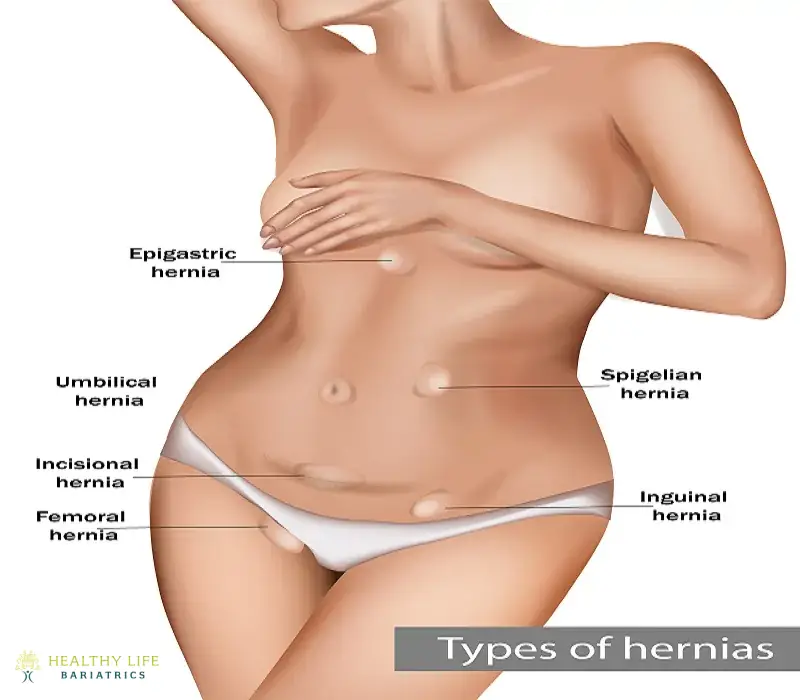
What Is a Hernia?
A hernia is where an organ or fat protrudes through the weakened spot within the structure of the abdominal wall. The most common type of abdominal hernia is the inguinal hernia, which primarily affects men. The risk increases with age, with the most common sufferers being 75 to 80.
What Causes a Hernia?
Hernias have a variety of possible causes, including:
- Congenital disabilities: Existing at birth, these occur if abdominal wall tissue fails to seal during fetal development properly. This is often the cause of umbilical or inguinal hernias in children.
- Straining: Chronic coughing, constipation with excessive straining to defecate, heavy lifting, or pregnancy/childbirth strain can gradually push tissue through weak spots.
- Prior Surgery: Incisions from past abdominal operations can develop weak scar tissue that gives way later on.
- Obesity: Increased weight places extra pressure on tissues. Fatty tissue more easily pushes through tiny openings.
- Aging: Muscles and connective tissues weaken over time. Men over 45 and women over 60 have higher hernia risks.
Recognizing and mitigating risk factors whenever possible, such as avoiding overly strenuous activity, managing coughs or constipation, losing excess weight, and quitting smoking, may help prevent hernia formation or reoccurrence after repair [1]. Still, hernias can develop in those without clear predisposing risks due to multi-factorial causes.
Hernia Assessment for Tailored Treatment in Los Angeles, CA
Doctors often diagnose hernias simply by physically examining the abdomen and groin areas. They look for visible or palpable bulges, especially when patients stand up or cough, which increases abdominal pressure and pushes tissues forward. The doctor identifies hernias by location, size, appearance of the overlying skin, and whether the contents can be pushed back in to determine the treatment approach [3].
In difficult-to-diagnose or characterize cases, imaging tests provide additional insight:
- Abdominal X-ray: Shows intestinal blockages with obstruction.
- CT Scan: Provides detailed images of abdominal and pelvic tissues.
- MRI Scan: Assesses soft tissues without radiation exposure.
Rarely do surgeons perform exploratory laparoscopy (a small incision allowing camera insertion) to inspect tissue before open hernia repair when adequate imaging cannot be obtained, or diagnosis remains equivocal.
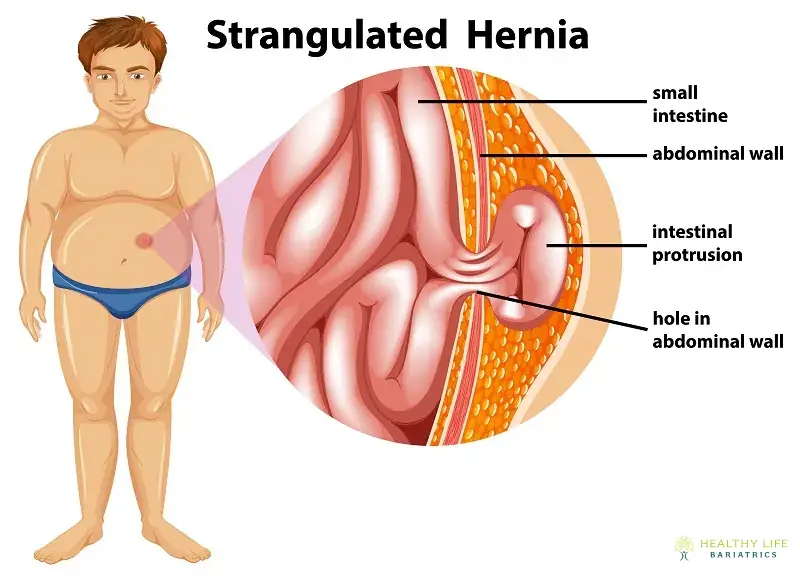
Advanced Hernia Repair Techniques Available in Los Angeles
For uncomplicated hernias causing symptoms, hernia repair surgery has excellent outcomes with minimal risk. Surgeons physically push back any protruding tissue and strengthen the area with stitches/mesh reinforcement so the abnormal opening cannot recur [1]. Several surgical techniques exist:
What Is an Inguinal Hernia?
The inner groin area has two passages in the lower abdomen called inguinal canals. An inguinal hernia occurs when the intestine protrudes through either of these two passageways. Experts believe 27% of men and 3% of women will eventually develop this condition.
What Are Other Hernia Types?
Femoral Hernia
This hernia occurs in the upper thigh or outer groin area and the more profound passages known as the femoral canals. These types of hernias are less common than inguinal hernias and tend to be more common in men. There is a substantial risk of complications if you don't repair the femoral hernia.
Ventral Hernia
These hernias happen when there is an opening in the abdominal muscles. The three types of ventral hernia include the epigastric hernia, which occurs above the belly button; incisional hernia, which is caused by a weakening of the abdominal muscle resulting from previous abdominal surgery; and umbilical hernia, which occurs near the belly button and is most common in premature newborns.
Hiatal Hernia
This hernia occurs when the upper portion of the stomach bulges through a small opening in the diaphragm.
What Are The Symptoms of a Hernia?
Many people with hernias experience a prominent bulge or lump, but not always. There may also be discomfort or pain. The symptoms may worsen when lifting heavy objects, standing, or straining. Most hernias are diagnosed following a physical test, while others are identified with advanced imaging tools.
Internal hernias are more complex to diagnose, as there is no visible evidence that something is amiss. Patients with internal hernias often experience abdominal pain. That pain can be located anywhere in the abdomen but is most often focused in the middle part of the abdominal cavity. It might also feel like a burning sensation, tearing, or sharp pain. Left untreated, the discomfort will likely increase as the hernia grows. Patients who are concerned about abdominal pain after a bariatric procedure should contact their surgeon.
How Do They Perform Hernia Surgery in Los Angeles, CA?
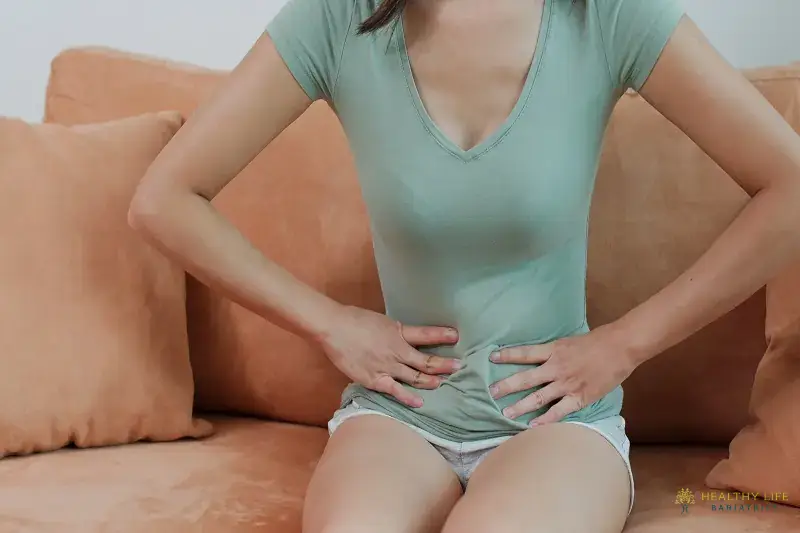
Hernia surgery used to involve open surgery, where the surgeon made an incision near the groin. This extended cut allowed the surgeon to view and repair the hernia. The surgeon sometimes closed the abdominal wall using stitches and others by using stitches along with a piece of mesh. The mesh was specially designed to strengthen weakened abdominal wall muscles to prevent future hernias.
Today, the surgeons perform hernia surgeries laparoscopically. The surgeon makes three or four small incisions along the lower abdomen. Tools are inserted into the cuts, which allow the surgeon to work on your abdominal wall remotely. The surgeon may also use a piece of medical mesh to close and strengthen the abdominal wall. Some surgeons use robotic repair, which has them controlling robotic arms that will go on to perform the surgery.
- A noticeable bulge under the skin, especially when bending over or coughing
- Pain or discomfort at the hernia site, especially when lifting heavy objects
- Pressure in the abdomen or groin area
- Feeling of heaviness or dragging in the abdomen
Types of Hernia Surgery Los Angeles, CA
Open Hernia Repair:
The traditional open hernia repair involves an incision directly over the hernia site. Surgeons then push the protruding tissue back into place and reinforce the weakened area with mesh or sutures. Advancements in this technique have led to reduced recovery times and minimized scarring.
Laparoscopic Hernia Repair:
The advent of laparoscopic or minimally invasive surgery has revolutionized hernia repair. This technique entails a few small incisions and a camera to guide the surgeon in repairing the hernia. The benefits of laparoscopic surgery include quicker recovery, less postoperative pain, and a lower risk of infection.
Robotic-Assisted Hernia Repair:
In recent years, robotic-assisted surgery for hernia repair has been gaining popularity. Surgeons control a robotic system to perform the procedure, ensuring greater accuracy in delicate maneuvers. This technique is particularly advantageous in complex hernia cases.
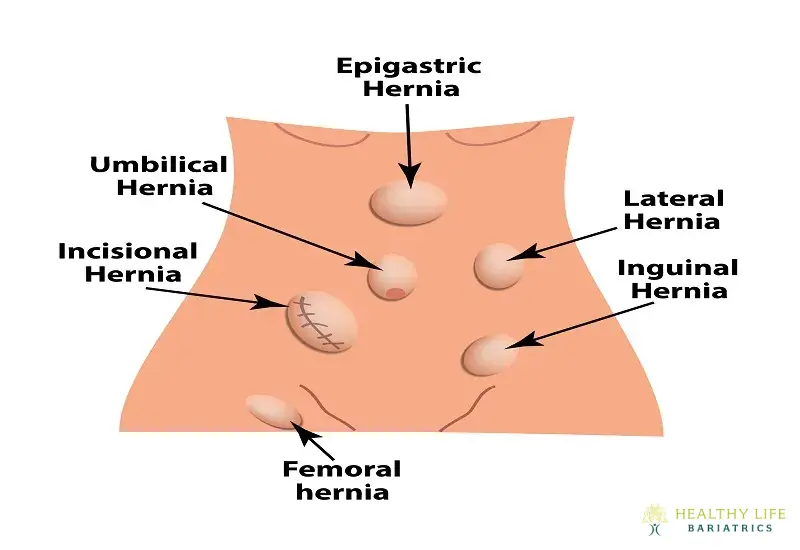
Advancements in Hernia Surgery Los Angeles, CA
Mesh Placement and Selection: Minimally Invasive Hernia Repair Options
Understanding the various mesh materials, such as synthetic and biological options, is not just standard practice in Hernia surgery Los Angeles, CA, but a crucial aspect. We'll delve into their advantages and potential complications, providing vital insights for informed decision-making.
The surgical mesh remains integral for most modern hernia repairs, though approximately 15-20% of patients develop some mesh-related complications that require additional treatment [8]. Mesh reinforces weakened muscular areas as a scaffold for surrounding tissues to incorporate into for durable support and tension. Previous problems with mesh shrinkage, migration after placement, adhesion formation with bowel obstruction, infection risk, chronic pain, and fistula development have Improved with the widespread adoption of softer, less reactive synthetic mesh products [9]. Still, mesh complications occur:
Infection – Occurs in ~3% of patients requiring antibiotics or mesh removal [10]. Those with prior infections near surgical sites remain at higher risk.
Adhesions Causing Bowel Obstruction– Scar tissue entrapping bowel loops may require surgical division later on. Proper fixation preventing mesh movement minimizes this.
Chronic Mesh Pain– Uncommon, but removing the sensitizing mesh sometimes improves intractable discomfort.
Hernia Recurrence– Prior infection or missed additional defects during initial repair can enable later herniation near mesh.
Seroma Fluid Collection– Temporary fluid build-up involving the recovery area occasionally needs drainage.
Tissue Engineering and Regenerative Medicine:
Innovations in hernia surgery are on the horizon with the integration of tissue engineering and regenerative medicine. Researchers are making strides in developing biocompatible materials that promote natural tissue regeneration, potentially reducing the need for traditional mesh implants. This promising avenue of research instills hope for improved patient outcomes and a brighter future for hernia surgery Los Angeles, CA.
Innovative Hernia Repair Techniques:
It's crucial to stay updated on the latest innovations in hernia surgery, including advancements in robotics, imaging technology, and novel suture materials. These innovations are not just about novelty but about enhancing the precision of surgical procedures and ultimately improving patient outcomes.
What Are The Risks of an Untreated Incisional Stomach Hernia?
An incisional hernia occurs when a surgical incision does not heal properly. Therefore, it allows a sac to develop that pushes out of the incision. The sac might also contain fecal matter or other waste products, and infection becomes a risk. In many cases, the hernia first begins to protrude from the incision site after exertion, such as lifting, coughing, or otherwise straining the abdominal area. This type of hernia can grow larger if left untreated for a while and can also be very painful.
What’s the Hernia Surgery Los Angeles, CA Recovery Timeline Like?
Postoperative Care and Recovery
Patients feel surprisingly well shortly after hernia surgery due to minimally invasive techniques and reduced tissue trauma. Yet healing and regaining strength remains a gradual process. The postoperative timeline averages:
Early Recovery – First Week
- Going home the same day or after overnight monitoring
- Using oral pain medications for surgical site soreness
- Walking around starting day 1 to prevent blood clot risks
- Cleaning incision sites with soap and water
- Removing surgical glue, tapes, or visible stitches at 7-10 days
Middle Weeks 2-4
- Having temporary bruising, swelling, numbness resolve
- Increasing activity as tolerated while avoiding lifting >25 lbs
- Driving once off narcotic pain pills and able to react normally
- Returning to deskwork jobs within 1-2 weeks if comfortable
- Still avoiding straining with constipation or heavy exercise
Late Months 1-3
- Having internal and external tissues finish strengthening
- Typically clearing for full activity without restrictions
- Building back muscle tone and exercise stamina
- Resuming strenuous workouts, lifting, sexual activity
Most patients see dramatic symptom relief right after hernia repair. Yet allowing adequate healing time before taxing abdominal muscles prevents recurrent herniation or slowed recovery.
Physical Therapy and Rehabilitation:
Rehabilitation is pivotal in the postoperative phase. Physical therapy exercises strengthen abdominal muscles, promoting faster recovery and reducing the risk of recurrence(6)
Dietary Guidelines for Recovery:
Proper nutrition is vital for healing after hernia surgery. Explore dietary recommendations that support tissue repair and minimize the risk of complications during the recovery period (7).
Managing Pain and Discomfort:
Please take a look at the various pain management strategies available post-surgery, ranging from medication to alternative therapies. Effective pain management is key to a smooth recovery process (8).
What Are The Risks of an Untreated Incisional Stomach Hernia?
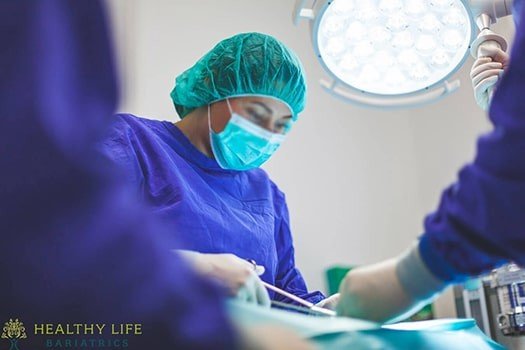
All surgeries carry risks from anesthesia reactions to bleeding and infection. Hernia operations remain extremely safe, with mortality rates only ~0.5% collectively [12]. The most frequent serious general surgery risks include:
Bleeding
Usually, minor leakage stops quickly. Large hematomas may need to be drained.
Infection
It affects ~4% of patients. Local wound infections are treated quickly, while mesh or deep tissue infections increase complications.
Blood clots
Immobility risks clots traveling to the lungs (pulmonary emboli). However, preventative blood thinners effectively avoid this, providing a secure management strategy.
Specific additional hernia repair risks beyond standard surgery complications include:
- Chronic pain at incision sites or testicular pain with inguinal hernia repairs
- Nerve injury during dissection and mesh placement leading to numbness
- Developing a fluid-filled seroma pocket near repair requiring drainage
- Failure to ultimately reduce an indirect hernia sac or testicular atrophy
- Hernia recurrence if repair integrity fails under pressure
These risks can be minimized by combining proper surgical techniques tailored for the hernia type, adequate postoperative rest, and restriction from straining activities until tissues strengthen. This approach offers an optimistic outlook, with most patients returning to normal within 1-3 months with restored abdominal wall integrity.
Schedule Your Hernia Surgery Consultation in Los Angeles, CA, Today
Not all hernias cause pain, but a hernia could lead to later complications. Get an official hernia diagnosis and a recommendation for hernia surgery by scheduling a consultation at Healthy Life Bariatrics. Call us throughout Los Angeles, Encino, or Glendale, California, to meet privately with world-class hernia surgeon Dr. Babak Moeinolmolki – at (310)861-4093. Don't wait; take the first step towards a healthier life today!

